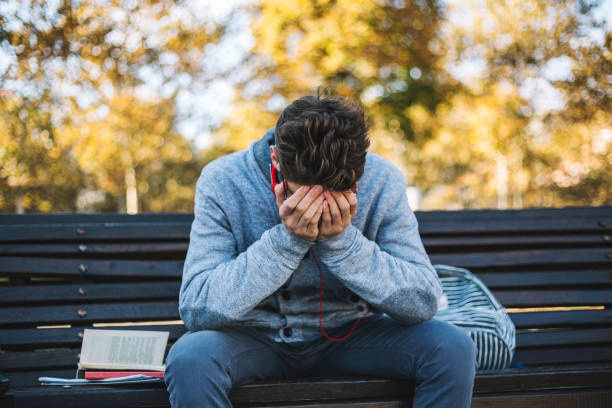6 Signs Your High Schooler Might Need Mental Health Support

Getty Images - Obradovic
The teenage years are a critical development period, marked by significant physical, emotional, and social changes. While it's a time of growth and discovery, it can also bring about mental health challenges that, if left unaddressed, may have long-lasting impacts.
Recognizing the early signs of mental health distress in high schoolers is crucial for timely intervention and support.
This article will outline six key indicators that your high schooler might need mental health support, empowering parents and educators to take proactive steps. Understanding these signs can create a supportive environment that promotes mental well-being and academic success.
Early identification and intervention can significantly change a young person's life. As we explore these signs, keep in mind that every teenager is unique, and these indicators should be considered in the context of your child's overall behavior and personality.
Changes in Academic Performance
A sudden drop in grades or a loss of interest in previously enjoyed subjects can be a significant indicator of mental health issues. You might notice increased procrastination, incomplete assignments, or a lack of participation in class discussions.
These changes could indicate underlying issues such as depression, anxiety, or attention disorders. It's crucial to approach these changes with empathy rather than judgment. Talk to your teen about what might be causing these difficulties, and consider contacting their teachers for additional insights.
Academic struggles can be both a symptom and a source of stress, creating a cycle that may require professional intervention to break. Early recognition and support can help prevent these issues from escalating and affecting your teen's future academic prospects.

Getty Images - FatCamera
Social Withdrawal
Avoiding friends and social activities, isolating from family members, and reluctance to participate in extracurricular activities are common signs of social withdrawal. This behavior can indicate depression, stress, or other mental health concerns.
Social connections are vital for adolescents, and a noticeable decline in social interactions warrants attention. For example, a teenager who used to enjoy spending time with friends might start avoiding social gatherings or become increasingly isolated in their room.
Encouraging open communication and seeking professional help can effectively address these issues. Schools often provide social skills groups or peer support programs to help students re-engage with their social environment and build healthy relationships. Some alone time is normal for teens navigating their identity, but lengthy isolation deserves attention.
Mood Swings and Emotional Volatility
While some moodiness is typical during adolescence due to hormonal changes and brain development, extreme or persistent mood swings can indicate deeper issues. Watch for frequent outbursts of anger or irritability that seem disproportionate to the situation, unexplained periods of intense sadness or crying that last for extended periods, or rapid shifts between different emotions.
Your teen might show increased sensitivity to criticism or perceived slights, leading to defensive or aggressive reactions. They may express feelings of hopelessness, worthlessness, or excessive guilt that persist over time. These mood swings could be signs of bipolar disorder, depression, anxiety, or other mental health conditions.
Creating a safe space for your teen to express their feelings without fear of judgment is important. Encourage them to talk about their emotions and what might be triggering these intense feelings. If these mood changes persist, interfere with daily life, or are accompanied by talk of self-harm or suicide, it's crucial to seek professional help.
Changes in Sleep Patterns
Insomnia, difficulty falling asleep, oversleeping, or excessive daytime sleepiness are significant changes in sleep patterns that can signal mental health problems.
Nightmares or night terrors may also be present. Adequate sleep is crucial for mental and physical health, and disruptions in sleep patterns can worsen mental health issues.
For example, a student who struggles to fall asleep at night might experience increased anxiety or depression. While changing sleep patterns are common in teens due to shifting circadian rhythms and increased demands, persistent issues warrant attention.
Encourage good sleep hygiene, such as consistent bedtimes, limited screen time before sleep, and a calm, dark sleep environment.
Physical Symptoms
Mental health issues can react in physical forms, especially in adolescents who may struggle to articulate their emotional experiences. Be aware of unexplained aches and pains that don't respond to typical treatments, such as frequent headaches or stomach aches without apparent cause.
Significant changes in appetite or eating habits, including sudden weight loss or gain, skipping meals, or secretive eating behaviors, can be warning signs.
You might notice a neglect of personal hygiene, such as not showering regularly, wearing unwashed clothes, or a noticeable decline in grooming habits. Another potential indicator is unexplained fatigue or energy loss that persists even with adequate sleep.
Physical symptoms of anxiety, such as rapid heartbeat, sweating, trembling, or complaints of feeling ill before school or social events, should not be overlooked.
These physical symptoms can be signs of depression, anxiety disorders, eating disorders, or other mental health conditions. It's essential to have your teen evaluated by a healthcare provider to rule out physical causes and consider potential mental health factors.
Risky or Self-Destructive Behaviors
Engaging in risky or self-destructive behaviors can be a cry for help or a way of coping with underlying mental health issues. Be alert for experimentation with drugs or alcohol, especially if it becomes frequent or interferes with daily life, schoolwork, or relationships.
Self-harm behaviors, such as cutting or burning, or talking about wanting to hurt oneself, are serious red flags. Look for unexplained cuts, bruises, scars, or a tendency to wear concealing clothing even in warm weather.
These behaviors could indicate depression, trauma, substance abuse disorders, or other mental health issues. Addressing these behaviors calmly but firmly is crucial, emphasizing your concern for their safety and well-being. Professional help is often necessary in these situations. It's worthwhile for your teenager and your relief to contact a mental health professional or school counselor for guidance.

Getty Images - 10'000 Hours
Call to Action
If you observe any of these signs in your high schooler, seeking help from a licensed professional is crucial. Schools often offer support systems, including counseling, early intervention programs, and community mental health organizations partnerships.
Parents can take steps to support their child's mental health by maintaining open communication, creating a supportive environment, and encouraging their child to express their feelings.
Initiating a conversation about mental health can be challenging, but it's a vital step in ensuring your child's well-being. A guidance counselor with an online Masters in School Counseling can provide the expertise to navigate these conversations and connect families with appropriate resources.
Encourage healthy coping mechanisms such as exercise, creative expression, mindfulness, or journaling, and participate in these activities with your teen when possible. Be patient and persistent, understanding that mental health improvements often take time.
Seeking help is a sign of strength, not weakness. Early intervention can significantly impact your teen's mental health and overall well-being.
Recognizing the signs of mental health issues in high school students is the first step toward early intervention and support. By being aware of changes in academic performance, social withdrawal, mood swings, sleep patterns, physical symptoms, and risky behaviors, you can take proactive steps to address these issues before they become more severe.
Early intervention and professional help are key to effectively addressing these concerns. Maintaining open communication and providing a supportive environment can make a significant difference in a teenager's mental health and overall well-being.